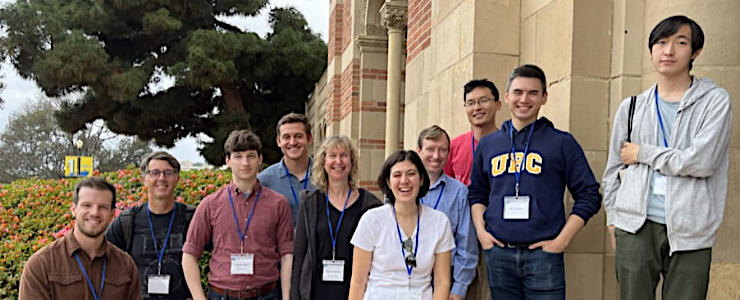Graduate Life in the Department
The graduate program in linguistics at UCSC is small, focused, and intense. It concentrates on a few core subdisciplines in linguistics: morphology, phonetics, phonology, pragmatics, psycholinguistics, semantics, and syntax. The department is distinguished by its theoretical open-mindedness; many disparate theoretical viewpoints co-exist in harmony, mutual respect, and active disagreement. In part because everyone becomes knowledgeable in more than one area—and in part because of the lively research environment—borders are fluid, and a great deal of research by students and faculty takes place at the interfaces.
While the graduate program centers on theory, it encourages the investigation of theoretical issues through the detailed examination and analysis of particular languages. Most of the faculty have research interests and expertise in particular language areas (e.g. Chamorro, English, German, Hungarian, Irish, Japanese, Kaqchikel, Northern Paiute, and Persian (Farsi), Romanian, Russian, Turkish, Tzotzil), and a characteristic of work done in the department in all disciplines is its commitment to sustained and deep descriptive work.
The goal of the PhD degree is to train researchers and teachers of the highest caliber, ready to embark on careers in academia or in industry. Students are first brought to the point where they can pursue research in at least two areas, and subsequently to the point where they can make substantial and original contributions to a single area of specialization. The goal of the MA degree—which like the PhD requires both coursework and research—is to provide a level of training suitable for entry into a PhD program in linguistics or into linguistics-related work in industry.
The research community that has formed around these shared goals at UCSC is informal, collaborative, and egalitarian. This makes for a lively work environment. A regular colloquium series brings in speakers from other institutions to present their current research. In addition, there are labs, working groups, and reading groups in a variety of areas, where students and faculty come together to share new ideas and to ask questions in an informal setting, giving informal presentations, discussing papers, or giving practice talks for a conference.
A highlight of the year is Linguistics at Santa Cruz (LASC), the annual graduate student research conference, which is the culmination of a quarter-long professionalization course known as the Research Seminar. By presenting their papers to the entire department and interested visitors, graduate students gain valuable conference experience at an early point in their career. In addition, students who are completing their PhD present their dissertation at a defense that is open to the entire department.
Research projects supported by extramural funding agencies play an important role in Linguistics, and graduate students learn first-hand about the construction of grant proposals and the management of grants in the research process. First and second-year students receive close mentorship in grant writing through their participation in a workshop in the fall quarter, which culminates in their application for a National Science Foundation (NSF) Graduate Research Fellowship.
Apart from its lively research life, the department is distinguished by its strong commitment to excellence in teaching (five of the eleven permanent faculty have won Teaching Excellence awards and many of its graduate students have won Outstanding Teaching Assistant awards). The graduate sequence of courses is tightly structured and carefully thought out, including explicit instruction in the pedagogy of linguistics.
The department has an undergraduate program to which it is very committed, and whose excellence is widely recognized. Graduate students are actively involved in undergraduate instruction; they teach under close supervision in their core areas of interest, and are closely mentored. Graduates of the PhD program emerge as experts and committed teachers, one reason they have been so successful in obtaining academic positions.
Finally, the campus itself, which is situated in the foothills of the Santa Cruz mountains overlooking the Monterey Bay, provides a work environment of unmatched natural beauty. Campus scenery alternates between coastal redwood forest and vistas of the harbor and of the bay.

